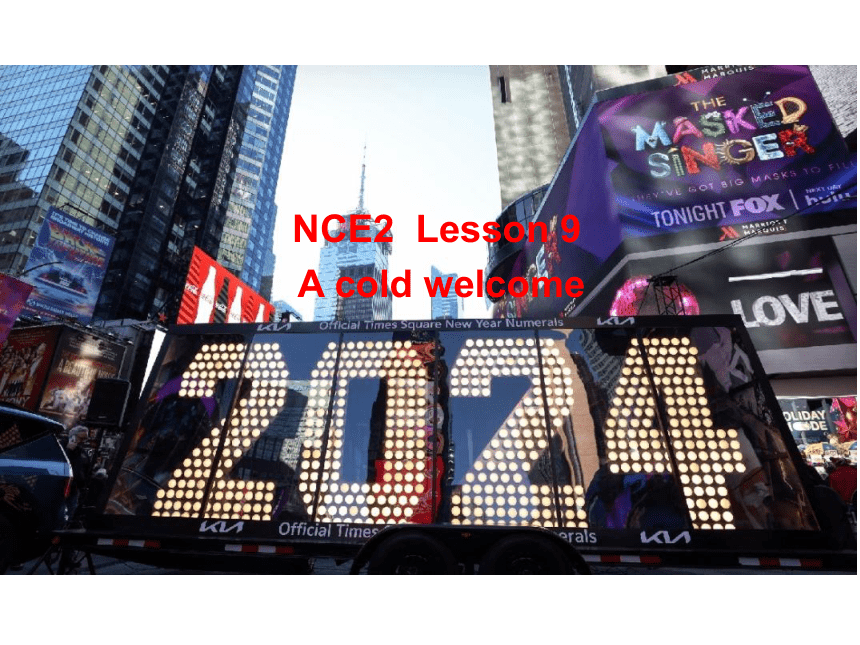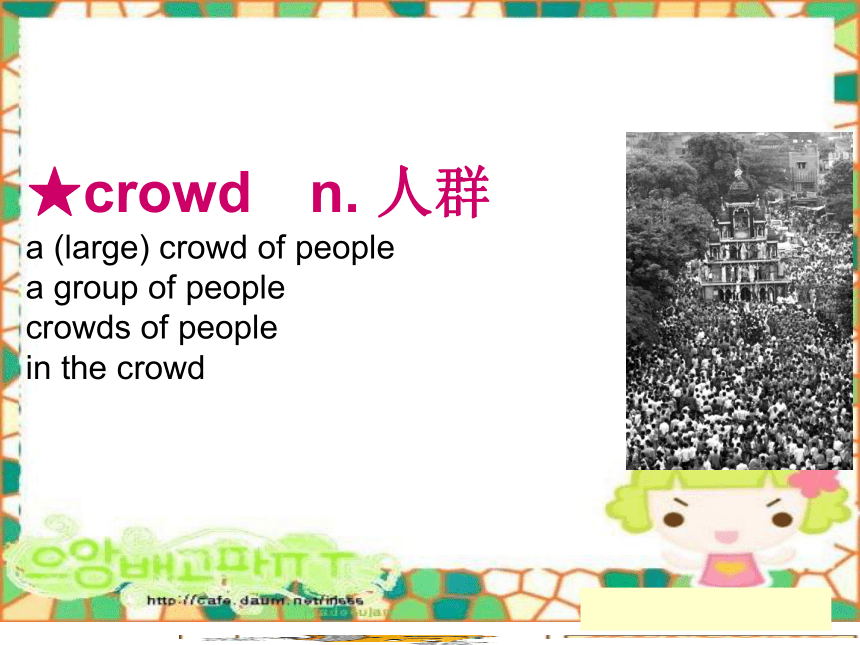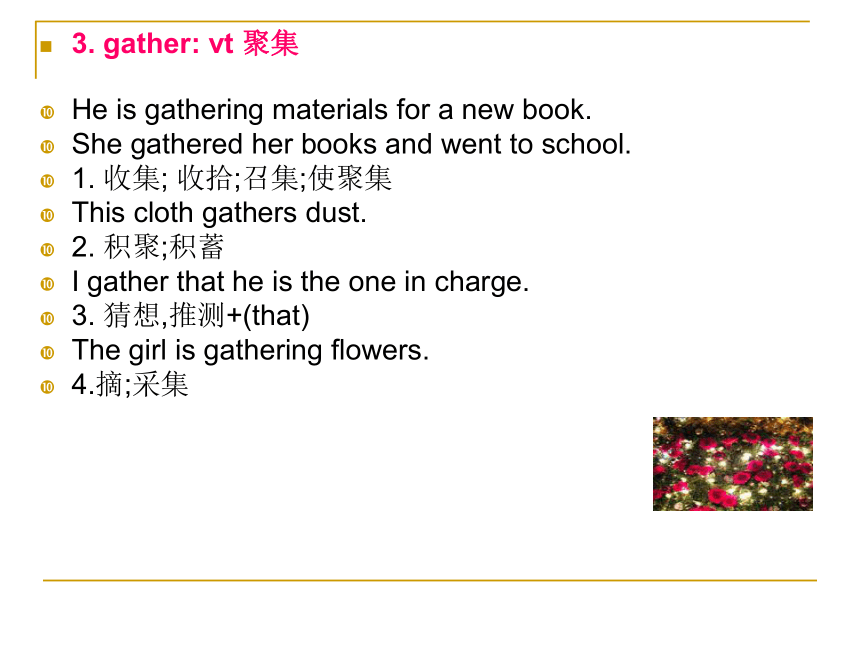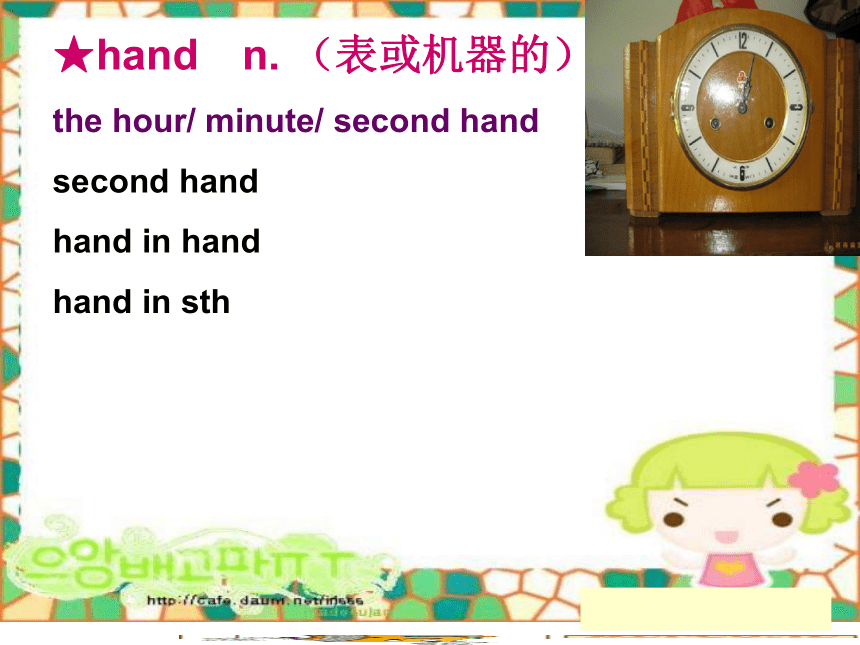新概念第二册Lesson 9 A cold welcome课件(共33张PPT)
文档属性
| 名称 | 新概念第二册Lesson 9 A cold welcome课件(共33张PPT) |  | |
| 格式 | pptx | ||
| 文件大小 | 3.9MB | ||
| 资源类型 | 教案 | ||
| 版本资源 | 新概念英语 | ||
| 科目 | 英语 | ||
| 更新时间 | 2024-08-26 12:47:14 | ||
图片预览












文档简介
(共33张PPT)
NCE2 Lesson 9
A cold welcome
Free talk
Look at the pictures.
New words & expressions
welcome n. 欢迎 v. 欢迎
crowd n. 人群
gather v. 聚集
hand n.(表或机器的) 指针
shout v. 喊叫
refuse v. 拒绝
laugh v. 笑
★ welcome n. v. adj
a cold welcome
welcome to+地点
You are welcome.
★crowd n. 人群
a (large) crowd of people
a group of people
crowds of people
in the crowd
3. gather: vt 聚集
He is gathering materials for a new book.
She gathered her books and went to school.
1. 收集; 收拾;召集;使聚集
This cloth gathers dust.
2. 积聚;积蓄
I gather that he is the one in charge.
3. 猜想,推测+(that)
The girl is gathering flowers.
4.摘;采集
★hand n. (表或机器的)指针
the hour/ minute/ second hand
second hand
hand in hand
hand in sth
★shout v. 喊叫
shout to/ at sb.
e.g.
我大声叫他别再这么大声地放音乐了。
I shouted to him to stop playing the music so loudly.
refuse: 拒绝
1:refuse to do sth. 拒绝做某事
She refused to help me.
2: refuse sth./sb. 拒绝某物(事)/某人
我拒绝了他的邀请。
I refused his invitation.
I was politely refused.
refusal: n.
e.g. The refusal hurt me deeply.
7. laugh: v 笑
laugh at sb/sth
1).因…而发笑
Eg:我们听了他的笑话都笑了。
We laughed at his jokes.
2).嘲笑
eg:不要嘲笑这个可怜的人.
Don’t laugh at this poor man.
laughter: 笑声
The house is always full of laughter.
strike v:打,击,弹,敲···(钟,乐器···)
struck struck
clock strike
strike the clock
Listening
A. Listen and answer the questions:
1. What does “a cold welcome” refer to
2. When did we go to the Town Hall
3. When would the clock strike twelve
4. What happened to the big minute hand
5. Did the big clock refuse to welcome the New Year
6. What did everybody do at that moment
Listen and fill in the blanks
We went to the Town Hall 1______ Wednesday evening, the 2______ day of the year. And under the Town Hall clock a large 3______ of people had 4_______ to welcome the New Year. It would 5______ twelve in twenty minutes’ time. But the clock 6______ at five to twelve. We 7______ and 8______, but nothing 9________. Suddenly someone shouted it was already two minutes 10______ twelve! The big clock 11______ to welcome the New Year. At the moment, everybody began to 12______ and sing.
on
last
crowd
gathered
strike
stopped
waited
waited
happened
past
refused
laugh
It would strike twelve in twenty minutes' time..
【语言点】"in"+一段时间可表示“一段时间之内”;也可用于表示“一段时间之后”,多用于将来时
①在…内:The bird covered the distance in 3 minutes.
② 在…之后(多与将来时连用):
I will come back in 5 days. 我将在5天后回来。
happen 发生
她出车祸了。
A car accident happened to her.
happen to 发生于… 身上
take place发生
1:45
2:35
6:47
1:58
one forty-five
two thirty-five
six forty-seven
one fifty-eight
1:45
2:35
6:47
1:58
fifteen to two
twenty-five to three
thirteen to seven
two to two
Summary writing
Answer these questions in not more than 50 words回答下列问题,将答案组成一个段落,不要超过50个单词。
1 Where did we go on New Year's Eve
2 Were there a lot of people there or not
3 In how many minutes would the Town Hall clock strike twelve
4 At what time did it stop
5 Did it refuse to welcome the New Year or not
6 What did the crowd do then
I When did we go to the Town Hall
2 When would the clock strike twelve
3 When did the clock stop
grammar
文中的时间状语及介词的使用:
On Wednesday evening
In twenty minutes
At five to twelve
It’s two minutes past twelve!
At that moment
The usages of in, on and at...
in:
1. 表示月份、年份、季节:
e.g.: in March/ 2024/ in summer
2. 早中晚
e.g.:in the morning/ afternoon/ evening/daytime
3. 表示“在某段时间之内”,
e.g.: I always eat my breakfast in ten minutes.
I finished the examination in two hours.
4. 表示“…时间之后”,
e.g.: Mother will be back in ten days.
on
1. 表示星期:
2. 表示日期:
on 13th August
3. 特定时日
on that day/ that evening/ on Christmas
day/ on New Year's Day/ on that raining day/on my birthday/ on a summer evening/
at:黎明、午夜和时分
1. 表示确切的时间:手表上的时间点
at 10 o’clock; at half past eleven
2. 表示用餐时间:
at lunch/ dinner time/ teatime
3. 表示其他时刻:
at dawn/at daybreak /at noon/ night/ midnight
at the weekend/at Christmas
during:
during the war/night/holiday
e.g.:
It was very hot during the summer.
She woke up many times during the night.
from … till… :
e.g.: I work from 8 a.m. till 9 p.m..
They are busy from morning till night.
not...till/until:
e.g.: I won’t leave till/until Monday.
They didn’t stop until six o’clock.
exercise b 用正确的介词填空
1) He has gone abroad. He will return___ two year’s time.
2)___Saturdays I always go to the market.
3) I never go to the cinema_____ the week.
4) He ran a hundred meters___ thirteen seconds.
5) I can’t see him ____ the moment. I’m busy.
6) My birthday is___ November 7th. I was born___ 1974.
7) The days are very short___ December.
8) We arrived at the village late___ night. We left early ___ the morning.
9) I shall not hear from him___ tomorrow.
阳光灯影衣冒 in
即在阳光下,在灯下,在树阴下,穿衣、着装、冒雨等都要用in。
in the bright sunlight
Don't read in dim light.
They are sitting in the shade of a tree.
in uniform
the woman in white
The poor dressed in rags in old society.
He went in the rain to meet me at the station.
in the eighteenth century
in ancient times
in earlier times
in modern times
in time
at the present day
on winter day
on Sunday
on Saturday afternoon
on time
on the morning of 18th
语法重点:介词
早、午、晚,要用in,at 黎明、午、夜、点与分;
年、月、年月、季节、周,阳光、灯、影、衣、冒in;
将来时态in...以后,小处at 大处in;
有形with 无形by,语言、单位、材料in;
特征、方面与方式、心情、成语惯用in;
日子、日期、年月日,星期加上早午晚; 以上全部都用on;
年月日,加早午晚,of 之前on 代in;
NCE2 Lesson 9
A cold welcome
Free talk
Look at the pictures.
New words & expressions
welcome n. 欢迎 v. 欢迎
crowd n. 人群
gather v. 聚集
hand n.(表或机器的) 指针
shout v. 喊叫
refuse v. 拒绝
laugh v. 笑
★ welcome n. v. adj
a cold welcome
welcome to+地点
You are welcome.
★crowd n. 人群
a (large) crowd of people
a group of people
crowds of people
in the crowd
3. gather: vt 聚集
He is gathering materials for a new book.
She gathered her books and went to school.
1. 收集; 收拾;召集;使聚集
This cloth gathers dust.
2. 积聚;积蓄
I gather that he is the one in charge.
3. 猜想,推测+(that)
The girl is gathering flowers.
4.摘;采集
★hand n. (表或机器的)指针
the hour/ minute/ second hand
second hand
hand in hand
hand in sth
★shout v. 喊叫
shout to/ at sb.
e.g.
我大声叫他别再这么大声地放音乐了。
I shouted to him to stop playing the music so loudly.
refuse: 拒绝
1:refuse to do sth. 拒绝做某事
She refused to help me.
2: refuse sth./sb. 拒绝某物(事)/某人
我拒绝了他的邀请。
I refused his invitation.
I was politely refused.
refusal: n.
e.g. The refusal hurt me deeply.
7. laugh: v 笑
laugh at sb/sth
1).因…而发笑
Eg:我们听了他的笑话都笑了。
We laughed at his jokes.
2).嘲笑
eg:不要嘲笑这个可怜的人.
Don’t laugh at this poor man.
laughter: 笑声
The house is always full of laughter.
strike v:打,击,弹,敲···(钟,乐器···)
struck struck
clock strike
strike the clock
Listening
A. Listen and answer the questions:
1. What does “a cold welcome” refer to
2. When did we go to the Town Hall
3. When would the clock strike twelve
4. What happened to the big minute hand
5. Did the big clock refuse to welcome the New Year
6. What did everybody do at that moment
Listen and fill in the blanks
We went to the Town Hall 1______ Wednesday evening, the 2______ day of the year. And under the Town Hall clock a large 3______ of people had 4_______ to welcome the New Year. It would 5______ twelve in twenty minutes’ time. But the clock 6______ at five to twelve. We 7______ and 8______, but nothing 9________. Suddenly someone shouted it was already two minutes 10______ twelve! The big clock 11______ to welcome the New Year. At the moment, everybody began to 12______ and sing.
on
last
crowd
gathered
strike
stopped
waited
waited
happened
past
refused
laugh
It would strike twelve in twenty minutes' time..
【语言点】"in"+一段时间可表示“一段时间之内”;也可用于表示“一段时间之后”,多用于将来时
①在…内:The bird covered the distance in 3 minutes.
② 在…之后(多与将来时连用):
I will come back in 5 days. 我将在5天后回来。
happen 发生
她出车祸了。
A car accident happened to her.
happen to 发生于… 身上
take place发生
1:45
2:35
6:47
1:58
one forty-five
two thirty-five
six forty-seven
one fifty-eight
1:45
2:35
6:47
1:58
fifteen to two
twenty-five to three
thirteen to seven
two to two
Summary writing
Answer these questions in not more than 50 words回答下列问题,将答案组成一个段落,不要超过50个单词。
1 Where did we go on New Year's Eve
2 Were there a lot of people there or not
3 In how many minutes would the Town Hall clock strike twelve
4 At what time did it stop
5 Did it refuse to welcome the New Year or not
6 What did the crowd do then
I When did we go to the Town Hall
2 When would the clock strike twelve
3 When did the clock stop
grammar
文中的时间状语及介词的使用:
On Wednesday evening
In twenty minutes
At five to twelve
It’s two minutes past twelve!
At that moment
The usages of in, on and at...
in:
1. 表示月份、年份、季节:
e.g.: in March/ 2024/ in summer
2. 早中晚
e.g.:in the morning/ afternoon/ evening/daytime
3. 表示“在某段时间之内”,
e.g.: I always eat my breakfast in ten minutes.
I finished the examination in two hours.
4. 表示“…时间之后”,
e.g.: Mother will be back in ten days.
on
1. 表示星期:
2. 表示日期:
on 13th August
3. 特定时日
on that day/ that evening/ on Christmas
day/ on New Year's Day/ on that raining day/on my birthday/ on a summer evening/
at:黎明、午夜和时分
1. 表示确切的时间:手表上的时间点
at 10 o’clock; at half past eleven
2. 表示用餐时间:
at lunch/ dinner time/ teatime
3. 表示其他时刻:
at dawn/at daybreak /at noon/ night/ midnight
at the weekend/at Christmas
during:
during the war/night/holiday
e.g.:
It was very hot during the summer.
She woke up many times during the night.
from … till… :
e.g.: I work from 8 a.m. till 9 p.m..
They are busy from morning till night.
not...till/until:
e.g.: I won’t leave till/until Monday.
They didn’t stop until six o’clock.
exercise b 用正确的介词填空
1) He has gone abroad. He will return___ two year’s time.
2)___Saturdays I always go to the market.
3) I never go to the cinema_____ the week.
4) He ran a hundred meters___ thirteen seconds.
5) I can’t see him ____ the moment. I’m busy.
6) My birthday is___ November 7th. I was born___ 1974.
7) The days are very short___ December.
8) We arrived at the village late___ night. We left early ___ the morning.
9) I shall not hear from him___ tomorrow.
阳光灯影衣冒 in
即在阳光下,在灯下,在树阴下,穿衣、着装、冒雨等都要用in。
in the bright sunlight
Don't read in dim light.
They are sitting in the shade of a tree.
in uniform
the woman in white
The poor dressed in rags in old society.
He went in the rain to meet me at the station.
in the eighteenth century
in ancient times
in earlier times
in modern times
in time
at the present day
on winter day
on Sunday
on Saturday afternoon
on time
on the morning of 18th
语法重点:介词
早、午、晚,要用in,at 黎明、午、夜、点与分;
年、月、年月、季节、周,阳光、灯、影、衣、冒in;
将来时态in...以后,小处at 大处in;
有形with 无形by,语言、单位、材料in;
特征、方面与方式、心情、成语惯用in;
日子、日期、年月日,星期加上早午晚; 以上全部都用on;
年月日,加早午晚,of 之前on 代in;
同课章节目录
